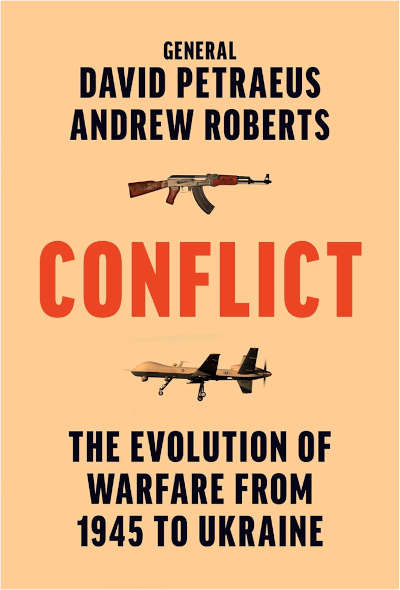In the picture
Cover of David Petraeus and Andrew Roberts' book 'Conflict. The Evolution of Warfare from 1945 to Ukraine' (London: William Collins, 2023) 544 pp.
During the years of counterinsurgency operations in Iraq and Afghanistan, a lively debate arose in specialized circles discussion on the validity of the 'Clausewitzian' idea of the existence of an immutable nature in war to which a changing character would be superimposed. For some, the nature of the phenomenon would have changed forever; for others, what would have actually happened is that war would have evolved in its face and external appearance (character), but would maintain its essence (nature) as a social phenomenon.
Conflict' is presented to the reader as a contribution to the study of the metamorphosis of the war phenomenon. It is a work written by four hands -although it is easy to identify the author of each chapter- in which Andrew Roberts, a renowned British historian, and David Petraeus, perhaps the most charismatic contemporary American general officer, make a selective and non-exhaustive journey through the evolution of war since the end of World War II, analyzing the armed conflicts that, from their point of view, have most contributed to change its face.
The book is of undoubted interest to anyone attracted to the history of warfare, even if they are not an expert on subject. It must be said, however, that it fails to deliver what it promises in its subtitle "The Evolution of Warfare from 1945 to Ukraine", and that it does not succeed in tracing the common thread that proves how each conflict has led to the evolution of the war phenomenon.
Certainly, the reading, at all times easy and captivating, offers something -quite a lot, if you will- of it but, in general, what the reader finds in its chapters, which can be read independently, is the description and analysis of a selection of the most important armed conflicts of the contemporary era, chosen in a somewhat debatable way and, perhaps, not entirely in keeping with the announced selection criteria in which, without being openly stated, the fact that the United States, Great Britain or both participated in them is included as an element of certain weight. In view of the selection, the subtitle of the work could have been "Evolution of war from the Anglo-Saxon point of view", since this is what the authors, one American, the other British, devote the main part of the book to, in which there is a great deal of flattery to their respective military capabilities.
The story, for example, begins by analyzing the Chinese civil war, waged by one of the parties with guerrilla procedures, but which cannot be said to have changed the face of the war, and which Mao always undertook with the idea of transforming it as soon as possible into a conventional confrontation. Or, to put another case, and despite all that the outbreak of war in the Falklands entailed, can it really be said that it was a memorable milestone in the evolution of warfare? Can the same be said of the Korean War? One misses, however, a reference letter to wars such as the one between Israel and Hezbollah in 2006, which called into question the EBO (Effects-based Operations) concept that had been in vogue up to that time.
The part dedicated to the operations 'Iraqi Freedom' and 'Enduring Freedom' has the value of the vivid; not in vain, both are narrated by the person who played the leading role in both as commander at different times, and who was also the intellectual father of the change of approach in Iraq towards counterinsurgency, which finally allowed the United States to leave the theater with some dignity, and which was later tried to be imitated in Afghanistan. The stories have this undoubted interest, which is not obscured by the forgivable dose of self-justification and self-praise they contain.
One of the 'leitmotifs' of the book, somewhat surprisingly in view of its degree scroll, has more to do with leadership than with the evolution of war, its causality, its motivations and the way it is waged. Perhaps under the influence of Roberts, a historian particularly interested in the question of command in wartime, he offers some valuable reflections on strategic leadership. With a Degree of detail differing from chapter to chapter, the work argues that political and military leaders must, in war, master four fundamental tasks: first, to fully understand the overall strategic status in a conflict in order to articulate the appropriate strategy-in a word, to grasp the 'big ideas' correctly; second, to communicate those ideas effectively; third, to oversee their implementation internship, directing the execution of the war with determination; and fourth, to determine how those ideas must be refined and adapted to changes in status in order to be able to execute the other three functions over and over again. Possibly this, along with their emphasis on the importance in war of morale and human aspects, is the authors' most relevant contribution to the literature on modern warfare.
At final, 'Conflict' is a very good book: recommendable; full of valid, useful, and interesting observations; attractive and easy to read, although it will probably not be among the five best works on the war in the future.

